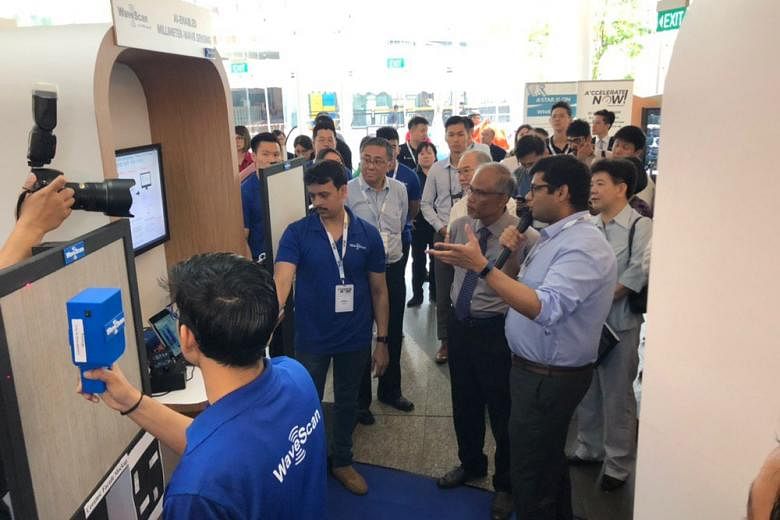SINGAPORE - From high-tech systems that allow farmers to predict yield and waste of produce to novel paper packaging material that protects food from oxygen or moisture degradation, Singapore firms are looking to science and technology for answers on how the nation can overcome challenges such as climate change, pollution and the over-consumption of resources.
"Science can shed light on the most appropriate pathways towards a sustainable future, while technology can help us get there more efficiently," said Minister for the Environment and Water Resources Masagos Zulkifli on Tuesday morning (Sept 10).
The public sector is also leveraging science to guide its policies.
To strengthen local climate science capabilities, for example, the Ministry of the Environment and Water Resources will set up a new climate science research programme office next year, said Mr Masagos.
He was speaking at the Leaders in Science forum, an event organised by the Agency for Science, Technology and Research (A*Star), developer JTC Corporation, and the National Research Foundation (NRF). The forum marks the opening of one-north Festival, a free five-day exhibition on research, science and innovation held at Fusionopolis One.
NRF chief executive Low Teck Seng said: "Science enables us to make informed decisions as we develop policies for a sustainable Singapore."
Whether in terms of growing sustainably and reducing the nation's carbon footprint, or adapting to the impacts of climate change, science, technology and engineering are key, said Prof Low.
Small island states like Singapore are vulnerable to rising sea levels. To mitigate against this, data is needed to determine how Singapore can protect its coastlines, and the types of impact such developments could have on the surrounding environment and biodiversity, he said.
To this end, the NRF has launched the Marine Science Research and Development Programme to spur research into how Singapore can better cope with emerging challenges such as climate change, heavy shipping and urbanisation.
It will also work with the Centre for Climate Research Singapore, which will drive efforts to develop Singapore's national climate science research masterplan.
Sustainability, Mr Masagos said, is no longer just a way for nations to provide a green and liveable environment.
"Sustainability has taken on an existential significance," said Mr Masagos, echoing Prime Minister Lee Hsien Loong's clarion call in August for Singapore to tackle climate change.
"Climate change, the over-consumption of resources, pollution of the air, land and water - these are all pushing our planet to a breaking point, threatening our very existence," he added.
Mr Masagos said that one way Singapore is dealing with these threats is by moving towards a circular economy - one in which resources are reused again and again, so that new resources do not have to be diverted to making fresh products.
Last week, for example, the Resource Sustainability Act was passed in Parliament, providing regulatory teeth for the Government to compel large firms to reuse and recycle food waste, electronic waste and packaging waste.
Researchers from the Nanyang Technological University are working to develop an enzymatic process to turn food waste into high-grade organic fertiliser in eight hours, a fraction of the usual 24-hour period needed in conventional methods.
Said Mr Masagos: "The enzymes used are cultivated from the food waste itself - indeed, nothing goes to waste."
Speaking to The Straits Times at the event, Dr Lee Chee Wee, director for the Aquaculture Innovation Centre at Temasek Polytechnic, likened technology to weapons in Singapore's quest to be more food-secure - echoing an analogy adopted by Prime Minister Lee Hsien Loong in his National Day Rally speech in August.
Dr Lee said: "Similar to how soldiers cannot fight a battle barefoot, farmers must invest in the latest technology to overcome constraints in land."
During Tuesday's event, the minister drew parallels between Singapore's sustainability journey and its water story, highlighting the need for collaboration across sectors - from government to academia and companies.
Academia provides scientific knowledge and the know-how to turn concepts into prototypes, while firms help to test-bed these innovations, help turn them into commercially viable products, and provide funding, he said.
The Government can also do its part by providing infrastructure, funding, platforms for collaboration, and a conducive regulatory framework, Mr Masagos added.
This collaboration has helped Singapore safeguard its water supply and groomed a thriving water sector, with almost 15,000 jobs across 200 firms as well as 25 research and development centres in the past decade.
Science, he said, must be the foundation of Singapore's sustainability journey.
"As we pursue science and technology for the betterment of Singapore and the world, I invite the research community and companies to partner with the Government to safeguard our environment for our children and grandchildren."
Professor Alfred Huan, executive director of A*Star's Urban and Green Tech Office, said science and technology can provide technical answers to the problems of today.
Waste sorting, for example, can be made easier and more efficient with technology.
"This will allow waste to be treated and re-used, brought back into the manufacturing cycle again," said Prof Huan.
But, he added that science and technology was no panacea.
"Getting the public to accept that sustainability has to be a way of life, that they all have to play a part, is also important."
Correction note: This article has been edited for clarity.


